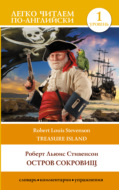Buch lesen: "Робинзон Крузо / Robinson Crusoe"
© Н. Д. Анашина, адаптация текста, упражнения, комментарии, словарь
Chapter 1
Start in Life
I was born in the year 1632, in the city of York. That was my mother’s hometown, because she also was born there, in a family of Robinson’s. They were very old and gentle family of York’sfaubourg,1 from whom I was called Robinson. My father, bored the name Kreutznaer, was German from Bremen. He earned his bread2 by trading, and, when his case went to the mountain,3 he moved to England, York. There he met my mother and later they got married. Eventually, the surname Kreutznaer grown into the Crusoe, by the usual corruption of words in England. Therefore, everyone calls me Robinson Crusoe.
I had two elder brothers. One of them went to the army, despite of my father’s prohibitions, and was killed at the battle near Dunkirk. What became of the second brother we never knew, he was missing.
From my childhood I dreamed about the adventures and pirates. I would be satisfied with nothing but going to sea.
Being the third son of my family, I wasn’t high-educated person. My father had given me house-education and country free school that was enough to be alawyer.4
When I grow up, my childish dreams of the sea turned into the real wish of becoming a captain, or a sailor at least. Oh, how the sea haunted my dreams that days!
My father, being a wise and grave man, guessed myintentions.5 One morning he called me into his chamber. He asked me very warmly not to left father’s home and not to repeat the fate of my elder brothers in a search of adventures. “You don’t have to earn your bread”, he said, “I’ll give you enough money to stay at your native country, become a lawyer, and get marriage. You are only eighteen, and I don’t want to lose my third son, when he is so young”. But I didn’t listen to him. He promised me a life of ease and pleasure, but I was going to a life of risky adventures and trying the fortune.
However, I wassincerely6 affected with my father’s discourse, and decided to wait with the final decision of my future life. I resolved not to think of going abroad one year more, but to settle at home, according to my father’s desire. That was a time, when I was trying myself in the different fields of learning, trying to find a profession that would be close to me. But my searches had been unsuccessful. It turned out, that I had no abilities to any crafts.7 After that, I had finally decided to link my future life with8 the sea. However, I could not left my parent’s home without their approval.9
One day, when my mother was in a good mood, I asked her for the help.
“Oh, mom, I’ll soon be nineteen years old, and it is too late to become a lawyer or clerk, I have no abilities to any crafts. I see no ways to make living, but go to sea. Please, speak to my father to let me go abroad and become a mariner!”
This put my mother into a greatpassion.10 She wondered how I could think in this way after the discourse I had had with my father, and such a kind and tender expression as she knew my father had used to me.
“Neither I, nor your father will bless you. If you don’t obey our advice, we will not take part in your future” – she said.
But for that moment, my decision was enough strong, and adrift, my wishes turned into the real life.
Being one day at Hull, where I went casually, I met one of my companions. He was about to sail to London in his father’s ship. He prompted me to go with him, promising that it should cast me nothing for mypassage.11 I consulted neither father nor mother about this voyage, even nor so much, as sent them a letter of it.
In an ill hour,12 God knows, on the 1st of September 1651, I went on board a ship bound for London.
The ship was no sooner out of the Humber than the wind began to blow and the sea to rise. I had never been at sea before, so it seemed to me, that the ship was caught in a heavy storm and will drown in a minute. Thepitching13 was so strong, that I could barely stand on my feet, the nausea stepped up to the throat.14 I thought, that were the last minutes of my life. And only then I realized what I’ve done: all the good counsels of my parents, my father’s tears and my mother’s entreaties,15 came fresh into my mind.
I swore to myself that if I could stay alive, I’ll come back to my parents inrepentance16 and spend all the entire life near parents in my family home. At that moment in my mind has already appeared the picture from the biblical story “Return of the prodigal son”.17
These wise andsober18 thoughts continued all the while the storm lasted, and indeed some time after; but the next day the wind was abated, and the sea calmer. However, I was very grave for all that day, being also a little sea-sick still; but towards night the weather cleared up, the wind was quite over, and a charming fine evening followed. The sun went down perfectly clear, and rose so next morning; and having little or no wind, and a smooth sea, the sun shining upon it, the sight was, as I thought, the most delightful that ever I saw.
I had slept well in the night, and was now no more sea-sick, but very cheerful, looking with wonder upon the sea that was so rough and terrible the day before, and could be so calm and so pleasant in so little a time after. And now, lest my good resolutions should continue, my companion comes to me: “Well, Rob,” says he,clapping me upon the shoulder,19 “how do you do after it? Were you freighted, last night, when it blew a capful of wind?” “A capful do you call it?” said I, “That was a terrible storm!” “A storm?!” replied he, “do you call that a storm? Why? It was nothing at all; give us a good ship and sea-room,20 and we think nothing of such a squall of wind as that; but you are a fresh-water sailor, Rob. Come, let us make a bowl of punch, and we’ll forget all that! Do you see what charming weather it is now?”
Die kostenlose Leseprobe ist beendet.








